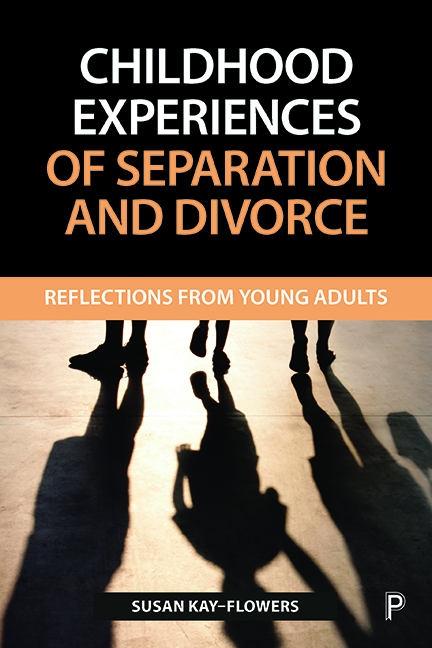Book contents
- Frontmatter
- Dedication
- Contents
- Figures and tables
- Acknowledgements
- One Introduction
- Two What is known about children’s experience of parental separation and divorce?
- Three The research study
- Four Constructing a new framework for understanding children’s accommodation of parental separation
- Five Setting the context for the framework: emotions
- Six Reactions
- Seven Support
- Eight Communication
- Nine Conflict
- Ten Future directions
- References
- Appendices
- Index
Two - What is known about children’s experience of parental separation and divorce?
Published online by Cambridge University Press: 27 April 2022
- Frontmatter
- Dedication
- Contents
- Figures and tables
- Acknowledgements
- One Introduction
- Two What is known about children’s experience of parental separation and divorce?
- Three The research study
- Four Constructing a new framework for understanding children’s accommodation of parental separation
- Five Setting the context for the framework: emotions
- Six Reactions
- Seven Support
- Eight Communication
- Nine Conflict
- Ten Future directions
- References
- Appendices
- Index
Summary
This chapter starts by describing the different types of families in the United Kingdom (UK) and goes on to explain some of the legislation governing marriage, civil partnerships and divorce. The UK comprises four home nations – England, Wales, Scotland and Northern Ireland – and there are legislative differences between them. Using data collected in each of the home nations the extent of divorce and civil partnership dissolution can be established and the number of children affected ascertained in England, Wales and Northern Ireland. Differences in the way the Scottish government collects data means that this information is not available in relation to Scottish children.
Legal processes involved in entering into marriage or civil partnership, and the ending of such relationships, means that the number of people affected can be established with some certainty, unlike couples who choose to live together informally as cohabiting couples. Office for National Statistics (ONS) statistics estimate the number of children who live in cohabiting couple families in the UK but the number affected by separation cannot be determined because such information is not collected.
The second part of the chapter explains the reasons for focusing on children's ‘voice’ and why this is important. Drawing on research from around the world, it reviews studies that articulate children's ‘voice’ in relation to their everyday experience of parental separation and divorce and identifies common themes emerging from the findings. The studies are identified and details relating to the age of children, size of sample and geographic location of the study, are provided.
The third part of the chapter describes what children said about their experience of parental separation.
Family types in the UK
The population of the four home nations of the UK is estimated to have been 65,648,054 people in mid-2016, which is the highest it has ever been (ONS, 2017a). Most of the people living in the UK live in England, which has a population of just over 55,200,000; 3,100,000 live in Wales, about 5,400,000 live in Scotland and over 1,800,000 live in Northern Ireland. Growth in the UK population is reflected in an increased number of families living in the UK, from 16.6 million in 1996 to 19.0 million in 2017 (ONS, 2017b).
- Type
- Chapter
- Information
- Childhood Experiences of Separation and DivorceReflections from Young Adults, pp. 7 - 40Publisher: Bristol University PressPrint publication year: 2019



